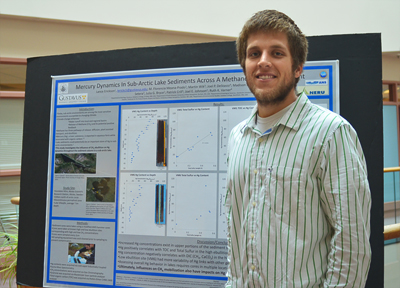Our geo-science and environmental science students hail from a wide range of institutions and disciplines. All are interested in scientific research and are participating in our study of biogeochemical processes in northern upland and wetland ecosystems.
2013 Students
 |
|
Lance Erikson
Gustavus Adolphus College
Geology and Environmental Studies major
A native of Pelican Rapids, MN, I am currently a senior geology major at Gustavus Adolphus College in St. Peter, MN. Most of my hobbies partake in the outdoors, thus leading me to this great opportunity in Sweden!
My research topic for this REU consists of studying mercury (Hg) in lake sediments over a methane gradient. Ultimately, I want to know the relationship between mercury and methane ebullition and whether or not methane ebullition is mobilizing mercury in the Stordalen Mire, Abisko, Sweden. Abisko serves as a great study site as it is situated in the discontinuous permafrost zone of the sub-arctic. Thus, Abisko's location is significantly susceptible to changing climate.
By studying the mercury in lake sediments over a methane gradient, I also want to try and determine how much mercury is available to be mobilized in this specific lake environment. To do this research, I will sub-sample sediment cores taken by the "lake sediment crew". I will sub-sample the cores at equal increments going down the depth of the core. Then back at UNH, I will analyze the mercury content using an ICP-MS instrument. This research is important as mercury is a toxic substance and with a warming environment, more mercury is potentially available for bacterial breakdown and movement throughout ecosystems.
 |
Lance Erikson with research poster "Mercury Dynamics in Lake Sediments Across a Methane Ebullition Gradient." |
|

